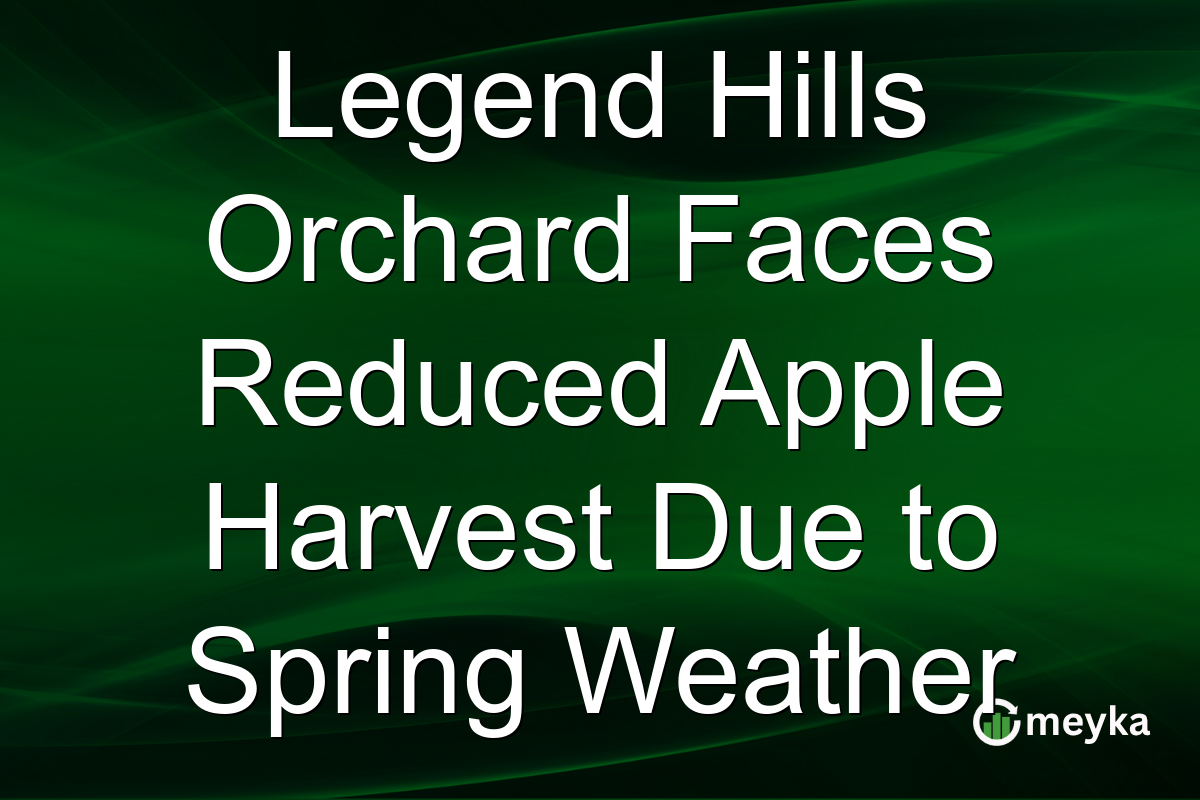Legend Hills Orchard Faces Reduced Apple Harvest Due to Spring Weather
Legend Hills Orchard in Utica, Ohio, is experiencing a significant downturn in its apple crop yield for 2025. This reduction is attributed largely to unfavorable spring weather, which has culminated in expectations of a below-average harvest season. As a result, local produce availability and broader market dynamics could see notable shifts, with both consumers and local markets feeling the impact. The orchard’s challenges highlight the increasing unpredictability of weather patterns and their direct effects on agriculture.
Adverse Weather Impacts on Production
This year’s spring was marked by unpredictable weather patterns that have profoundly impacted apple production at Legend Hills Orchard. Late frosts and unseasonably cold temperatures in April critically affected apple blossoms. According to the orchard, frost damage is expected to reduce their production by an estimated 30% compared to average years. This situation is reflective of broader agricultural challenges, where changing climatic conditions are affecting crop yields worldwide. The weather impact is not just a local concern. It underscores a growing trend whereby agriculture is increasingly vulnerable to environmental shifts. This necessitates adaptations in both farming practices and market strategies to ensure sustainability. For details about the specific apple varieties affected, visit Legend Hills Orchard’s resources on their apples page.
Implications for Local and Regional Markets
The anticipated reduction in the Legend Hills Orchard apple crop will likely influence both local consumer availability and pricing. A smaller crop often translates to higher prices due to scarcity, impacting everything from grocery stores to local farmers’ markets. Historically, Ohio has been a key region for apple production, contributing significantly to local economies and food supplies. Such reductions can shift consumer behavior as people turn to alternative sources or even different fruits. This, in turn, creates opportunities for other local produce growers but can also challenge those dependent on apple-based products. For specific picking tips and seasonal updates, see their what’s picking page. This showcases the orchard’s efforts to maintain consumer engagement despite the challenging season.
Market Sentiment and Adaptation Strategies
Market sentiment around Legend Hills Orchard is cautiously watchful. The unpredictable weather patterns have spurred discussions on platforms like Reddit, with growers sharing experiences and adaptation techniques. Farmers are increasingly exploring resilient crops and investing in technologies to mitigate weather impacts. Investors and local business stakeholders may need to adjust expectations and strategies. Diversifying crop portfolios and adopting advanced agricultural technologies are potential paths towards more stable futures. Legend Hills’ situation serves as a wake-up call to the wider agricultural sector to incorporate climate resilience into planning and operational strategies.
Final Thoughts
Legend Hills Orchard’s reduced apple harvest in 2025 is a stark reminder of the vulnerabilities agriculture faces due to climate change. The local market dynamics will likely adjust with higher apple prices and potential availability challenges, driving consumers to alternative options. For investors and agricultural businesses, the time is ripe to embrace resilient practices and innovative technologies. The necessity for change is clear, with Legend Hills Orchard illustrating the urgent need for a proactive approach to modern agricultural challenges. Platforms like Meyka can provide valuable insights and predictive analytics, helping the sector navigate these tumultuous times and emerge more robust. Staying informed and adaptable is not just advisable but essential in today’s market.
FAQs
Legend Hills Orchard’s reduced harvest is due to adverse spring weather, notably late frosts and cold spells, which damaged apple blossoms and decreased yield by about 30%.
A smaller apple crop is likely to result in higher prices and limited availability at local markets, prompting consumers to seek alternatives and impacting apple-based businesses.
Farmers can adopt climate-resilient crops, diversify produce varieties, and invest in advanced agricultural technologies to lessen the impact of unpredictable weather conditions.
Disclaimer:
This is for information only, not financial advice. Always do your research.






